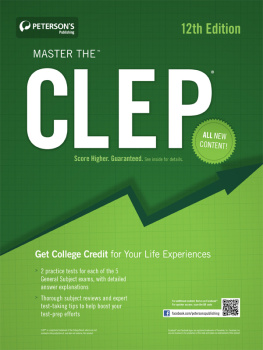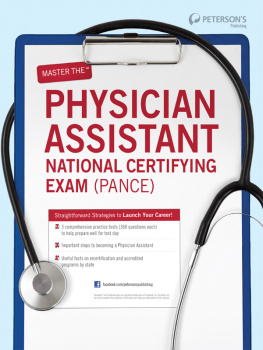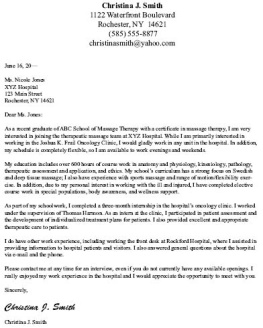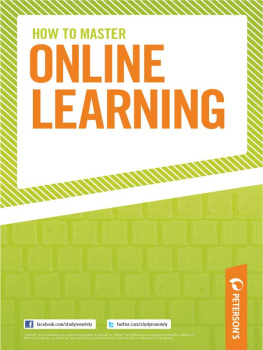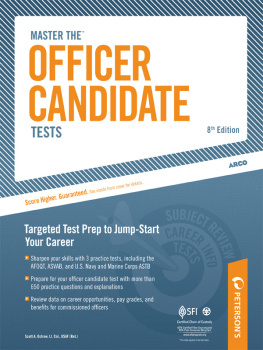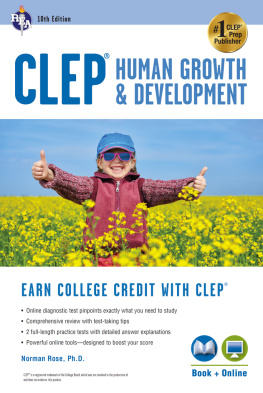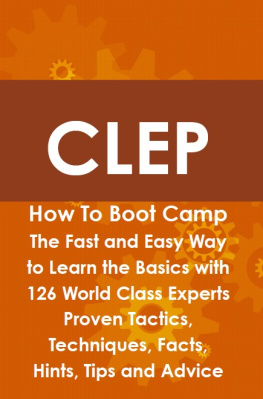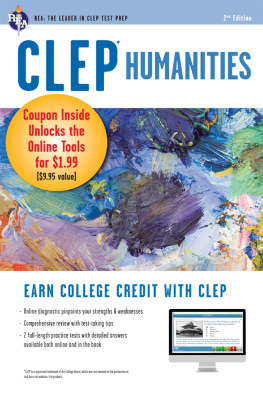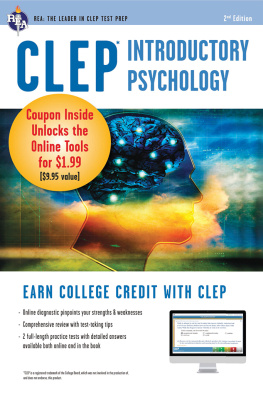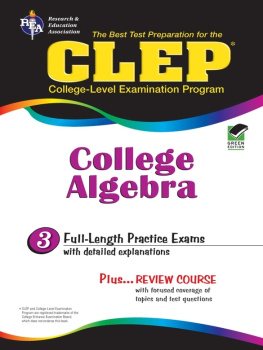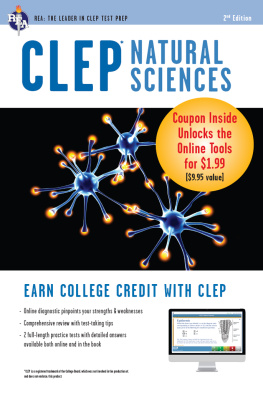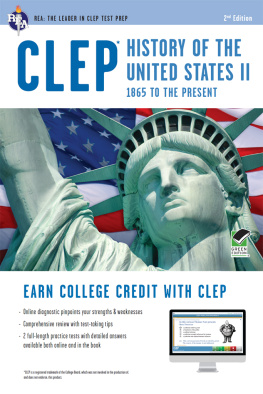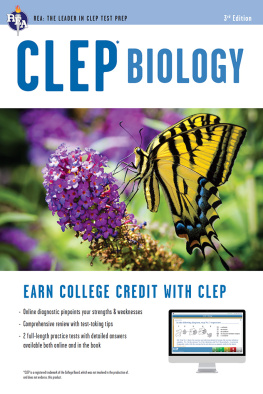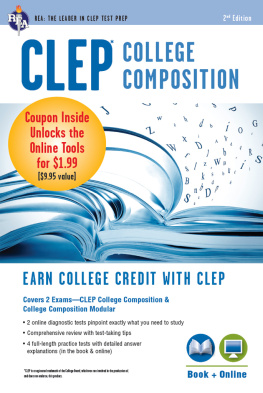

About Petersons Publishing
To succeed on your lifelong educational journey, you will need accurate, dependable, and practical tools and resources. That is why Petersons is everywhere education happens. Because whenever and however you need education content delivered, you can rely on Petersons to provide the information, know-how, and guidance to help you reach your goals. Tools to match the right students with the right school. Its here. Personalized resources and expert guidance. Its here. Comprehensive and dependable education content delivered whenever and however you need it. Its all here.
For more information, contact Petersons, 2000 Lenox Drive, Lawrenceville, NJ 08648; 800-338-3282 Ext. 54229; or find us online at www.petersonspublishing.com.
2011 Petersons, a Nelnet company
Previous editions 1994, 1996, 1998, 2001, 2003, 2004, 2005, 2007, 2010
CLEP is a registered trademark of the College Board, which was not involved in the production of, and does not endorse, this product.
Facebook and Facebook logos are registered trademarks of Facebook, Inc. Facebook, Inc. was not involved in the production of this book and makes no endorsement of this product.
Bernadette Webster, Director of Publishing; Mark D. Snider, Editor; Ray Golaszewski, Publishing Operations Manager; Linda M. Williams, Composition Manager
ALL RIGHTS RESERVED. No part of this work covered by the copyright herein may be reproduced or used in any form or by any meansgraphic, electronic, or mechanical, including photocopying, recording, taping, Web distribution, or information storage and retrieval systemswithout the prior written permission of the publisher.
For permission to use material from this text or product, complete the Permission Request Form at http://www.petersons.com/permissions.
e-ISBN-978-0-7689-3630-8
PART I
....................... INTRODUCTION TO THE COLLEGE-LEVEL EXAMINATION PROGRAM (CLEP)
....................... |
Chapter 1: The College-Level Examination Program (CLEP)
WHAT IS THE CLEP?
Colleges and universities across the nation have long relied on standardized assessment tests such as the SAT Reasoning Test and the ACT to judge students academic abilities and preparedness for college. These tests have served students who follow a traditional educational pathelementary school, secondary school, postsecondary educationquite well. But not all students gain their education in a traditional way. Some learn through hands-on training, independent study, or professional development programs. How do these students get their foot in the door at colleges and universities and prove that they have the academic chops to make it in a college classroom? The answer is the College-Level Examination Program, or CLEP.
The CLEP is a collection of thirty-three exams sponsored by the College Board. The exams, which are developed by college faculty across the nation, are designed to indicate college-level mastery of course content in a wide range of subject areas. The CLEP is an advantageous alternative for many students, as it helps to shorten the length of time required to earn a degree and lowers the cost of a college education. When taking CLEP exams, students rely on knowledge they have acquired through various means, not only what they have learned in a formal classroom setting. Those who earn a qualifying score have the opportunity to earn college credits and even bypass certain college classes, thereby allowing them to advance to higher levels of academic study at a faster rate and earn their degrees in less time.
The various CLEP exams will be discussed in more detail later, but the exams fall into five general content categories:
- Composition and Literature
- World Languages
- History and Social Sciences
- Science and Math
- Business
Most of the tests are composed mainly of multiple-choice questions and last about 90 minutes. A few exams include other question types or optional essays. The tests are administered on computers, but for some of the tests, paper-and-pencil exams are available for those who cannot take the computerized exam.
WHO TAKES THE CLEP?
Tests such as the SAT Reasoning Test and the ACT are geared toward high school students about to enter college, but people of all ages and skill levels can take the CLEP. From the college student who wants to earn his or her degree at a fraction of the cost to the working parent who must balance school with work and family responsibilities to the professional looking to change careers, the CLEP is a flexible alternative that gives people the chance to put their college-level knowledge and abilities to the test.
CLEP GENERAL EXAMINATIONS
The CLEP includes both general examinations, which test a broad subject area, and subject examinations, which focus on one particular area of study and usually correspond to a particular college course. The following are the five general CLEP examinations:
- College Composition
- College Mathematics
- Humanities
- Social Sciences and History
- Natural Sciences
College Composition
Added in 2010, the College Composition exam replaced the English Composition with Essay exam. The College Composition exam is a 120-minute test that includes fifty multiple-choice questions and two mandatory essays. The multiple-choice questions focus on conventions of Standard Written English, revision skills, the ability to use source materials, and rhetorical analysis. The essays assess argumentation, analysis, and synthesis skills.
College Mathematics
The College Mathematics exam is a 90-minute test that includes about sixty multiple-choice questions. About half are straightforward problems, while the other half require more extensive knowledge of underlying skills and concepts. Topics covered in the College Mathematics exam include math sets, logic, the real number system, functions and their graphs, probability and statistics, algebra, and geometry.
Humanities
The Humanities exam is a 90-minute test that includes 140 multiple-choice questions about literature and the arts. Half of the questions focus on literature, including fiction, nonfiction, poetry, and dramatic works. The other half focus on the arts, including visual arts such as painting, sculpture, and architecture and performing arts such as music, theater, dance, and film. The test covers periods from classical to contemporary, and some questions are cross-cultural in scope.
Social Sciences and History
The Social Sciences and History exam is a 90-minute test that includes 120 multiple-choice questions. About 40 percent of the test questions focus on history, including U.S. history, world history, and Western civilization. The remaining questions are drawn from subject areas including anthropology, economics, geography, government/political science, psychology, and sociology.
Natural Sciences
The Natural Sciences exam is a 90-minute test that includes 120 multiple-choice questions. The Natural Sciences exam is generally used to fulfill general education science requirements. The test questions split evenly between two subject areas: biology and physical science.
CLEP SUBJECT EXAMS
Next page
